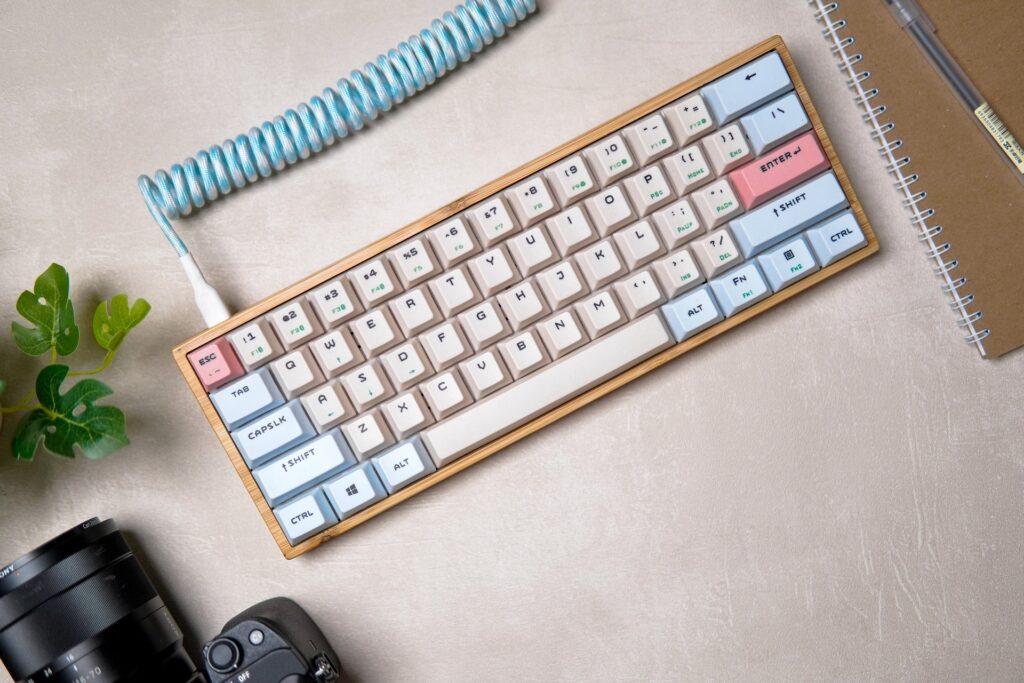
When it comes to typing, mechanical keyboards offer several advantages over standard rubber dome or membrane keyboards. The most notable benefit is the super consistent keystrokes that mechanical keyboards provide. Unlike the membrane keyboards, mechanical keyboards have dedicated switches for each key, ensuring reliable keystroke registration. Additionally, mechanical keyboards allow for the customization of switches, enabling users to choose between clicky, linear, and tactile switches based on their typing preferences. This level of customization is especially beneficial for typists seeking the most accurate and enjoyable typing experience.
Table of Contents
- The Basics of Mechanical Keyboards and Their Advantages
- Enhanced Typing Experience with Mechanical Keyboards
- Customization: Tailoring Your Typing Experience
- Durability and Longevity of Mechanical Keyboards
- Additional Features That Make Mechanical Keyboards Superior
- Real User Experiences with Mechanical Keyboards
- Conclusion
The Basics of Mechanical Keyboards and Their Advantages
When it comes to typing, the choice of keyboard can significantly impact comfort and efficiency. Understanding how mechanical keyboards work and comparing them with traditional membrane keyboards is crucial in making an informed decision.
Understanding How Mechanical Keyboards Work
Mechanical keyboards are built with individual mechanical switches for each key, providing a tactile response and a distinct “click” sound. These switches are made of multiple moving parts, such as springs and metal contacts, resulting in a satisfying and responsive typing experience. The design of mechanical switches allows for faster actuation and increased durability compared to membrane keyboards.
 Photo by RDNE Stock project
Photo by RDNE Stock project
The Downfalls of Traditional Membrane Keyboards
In contrast, traditional membrane keyboards use a single rubber dome membrane beneath the keys to register keystrokes. This design often leads to a mushy feel and a lack of tactile feedback, causing slower typing speeds and potential strain on the fingers and wrists. The membrane’s susceptibility to wear and tear can also result in a shorter lifespan for membrane keyboards.
By comprehending the inner workings of mechanical keyboards and acknowledging the limitations of membrane keyboards, individuals can appreciate the advantages offered by mechanical keyboards for an enhanced typing experience.
Utilize the links to learn more about the differences between mechanical and membrane keyboards and explore the history of mechanical keyboards.
Enhanced Typing Experience with Mechanical Keyboards
Typing on a mechanical keyboard offers a remarkably enhanced experience due to several key features that contribute to increased precision, accuracy, and overall satisfaction.
Consistent Keystroke Feedback
Each key press on a mechanical keyboard provides consistent tactile and auditory feedback, ensuring that every stroke is registered with clarity and precision. This feature allows typists to develop a rhythmic typing flow, resulting in a more satisfying and efficient typing experience.
Photo by Stefan 
The Role of Spring-Loaded Keys in Typing Precision
Mechanical keyboards are equipped with spring-loaded keys that contribute to typing precision by offering resistance and responsiveness. This unique mechanism ensures that each key press is deliberate, reducing the likelihood of accidental keystrokes and promoting a more controlled and accurate typing experience.
Reduced Typing Errors and Improved Accuracy
With the distinct tactile feedback and responsive nature of mechanical keyboards, typists experience a significant reduction in typing errors. The increased accuracy achieved through the precise actuation of keys enhances overall typing efficiency, making these keyboards an optimal choice for individuals seeking an elevated typing experience.
Photo by Christina Morillo 
Customization: Tailoring Your Typing Experience
When it comes to mechanical keyboards, one of the key advantages is the ability to customize and tailor the typing experience to suit individual preferences. From choosing the perfect switch to personalizing the keyboard layout, the world of customization offers a plethora of options to enhance your typing experience.
A World of Switches
Selecting the right switch for your mechanical keyboard is crucial in determining the feel and sound of each keystroke. With a wide range of switches available, from the clicky and tactile to the smooth and linear, each type offers a distinctive feel. Whether you prefer a satisfying click with every press or a smoother, quieter keystroke, there’s a switch that aligns with your typing style.
 Photo by FOX
Photo by FOX
Finding the Right Switch for Your Typing Style
Exploring and experimenting with different types of switches can be an exciting journey as you search for the one that best complements your typing habits. Factors such as actuation force, tactile feedback, and auditory response play a significant role in determining the ideal switch for your individual preferences.
Personalizing Your Keyboard for Optimal Comfort and Efficiency
Once you’ve found the perfect switch, personalizing your keyboard further can contribute to enhanced comfort and efficiency. This can include custom keycap sets, wrist rests, and even programmable macros to streamline your workflow. By tailoring your keyboard to your specific needs, you can achieve a typing experience that is not only enjoyable but also optimized for productivity.
Durability and Longevity of Mechanical Keyboards
When it comes to durability and longevity, mechanical keyboards stand out as a top choice for typing enthusiasts. These keyboards are built to last, offering a robustness that surpasses traditional membrane keyboards. The components within mechanical keyboards, such as switches and keycaps, are designed to withstand millions of keystrokes, ensuring that they maintain their tactile responsiveness and accuracy over time.
Built to Last
One of the key factors contributing to the durability of mechanical keyboards is the quality of their construction. Unlike membrane keyboards, which utilize a single rubber membrane for all keys, mechanical keyboards feature individual mechanical switches beneath each key. This design not only enhances the typing experience but also contributes to the keyboard’s longevity. Mechanical switches are commonly rated for tens of millions of keystrokes, providing a level of reliability that is unmatched by membrane keyboards.
The Cost-Effectiveness of a Long-Term Investment
While the initial cost of a mechanical keyboard may be higher than that of a membrane keyboard, its long-term durability makes it a cost-effective investment. With proper care and maintenance, a mechanical keyboard can serve as a dependable typing tool for many years, delivering consistent performance and tactile comfort. This longevity ultimately translates to savings in the long run, as users can avoid the need for frequent replacements or repairs associated with less durable keyboards.
 Photo by fauxels
Photo by fauxels
Additional Features That Make Mechanical Keyboards Superior
When it comes to typing, mechanical keyboards offer a host of additional features that set them apart from their membrane counterparts. These features cater to the needs of fast typists, productivity enthusiasts, as well as aesthetes and ergonomic enthusiasts. Let’s delve into the distinct attributes that make mechanical keyboards superior.
N-Key Rollover and Anti-Ghosting for Fast Typists
One standout feature of mechanical keyboards is the N-key rollover, ensuring that each key press is accurately registered, even when multiple keys are pressed simultaneously. This attribute eliminates the frustration of ghosting, where certain key combinations go unacknowledged. For swift typists, gamers, and professionals who rely on rapid inputs, this capability is indispensable, guaranteeing a seamless and precise typing experience.
Programmable Keys for Enhanced Productivity
Many mechanical keyboards come equipped with programmable keys, allowing users to customize and assign specific functions or macros to individual keys. This level of personalization heightens efficiency, streamlining workflows and tasks. From simple shortcuts to complex command sequences, the ability to program keys empowers users to execute actions swiftly, making mechanical keyboards an asset for productivity-driven individuals.
Aesthetic and Ergonomic Benefits
In addition to their functional advantages, mechanical keyboards also offer aesthetic appeal and ergonomic benefits. With a wide range of switch types boasting distinct tactile feedback and audible sounds, users can select a keyboard that aligns with their preferences, whether they seek a quiet, linear switch or a tactile, clicky one. Moreover, the ergonomic design of many mechanical keyboards, featuring adjustable tilt angles and wrist rests, aims to reduce strain and enhance comfort during extended typing sessions.
 Photo by Skitterphoto
Photo by Skitterphoto
These additional features collectively contribute to the superiority of mechanical keyboards, catering to the diverse needs of users who prioritize performance, customization, and overall typing experience.
Real User Experiences with Mechanical Keyboards
Professional typists and gamers have shared compelling testimonials and case studies highlighting the superiority of mechanical keyboards in enhancing their typing experiences. Their firsthand accounts provide valuable insights into the advantages of using mechanical keyboards in different scenarios.
Testimonials from Professional Typists and Gamers
Samantha, Professional Writer
 Photo by Vlada Karpovich
Photo by Vlada Karpovich
“As a professional writer, the tactile feedback and distinct keypress of mechanical keyboards have significantly improved my typing speed and accuracy. The responsive nature of the keys allows for a more seamless writing experience, ultimately enhancing my productivity and overall satisfaction with my work.”
Case Studies
Mark, Competitive Gamer
“Using a mechanical keyboard has been a game-changer for my competitive gaming endeavors. The precise actuation and tactile feedback of mechanical switches have given me a competitive edge in fast-paced gaming environments. The durability of mechanical keyboards also ensures consistent performance during intense gaming sessions, solidifying their superiority over conventional keyboards.”
These real user experiences underscore the tangible benefits of mechanical keyboards in professional and gaming contexts, establishing them as the preferred choice for individuals seeking optimal typing performance and reliability.
Conclusion
In conclusion, the benefits of using a mechanical keyboard for typing are undeniable. With super consistent keystrokes and the ability to customize switches for accurate typing, it’s clear that mechanical keyboards are superior for typing. Whether you’re a professional typist or a casual user, the tactile feedback and reliability of mechanical keyboards make them a top choice for anyone looking to enhance their typing experience.
